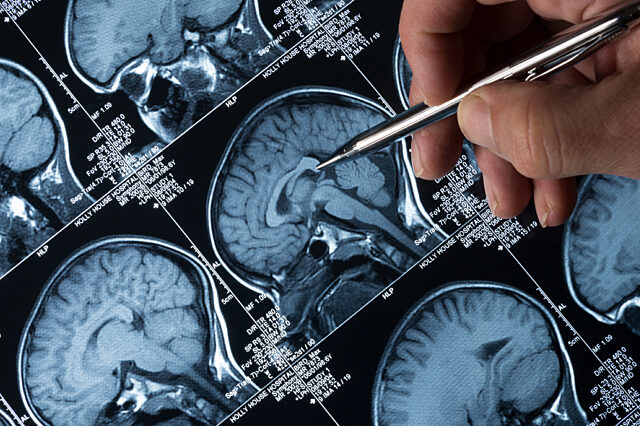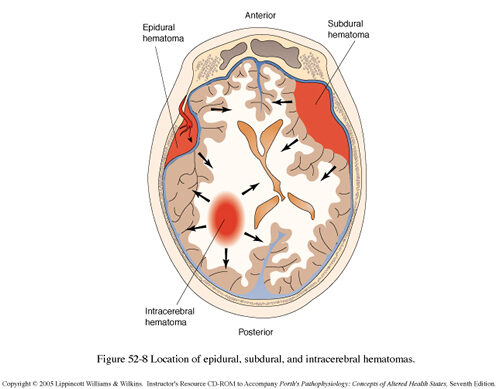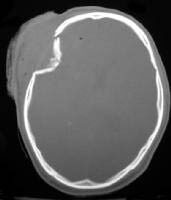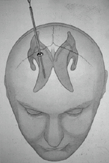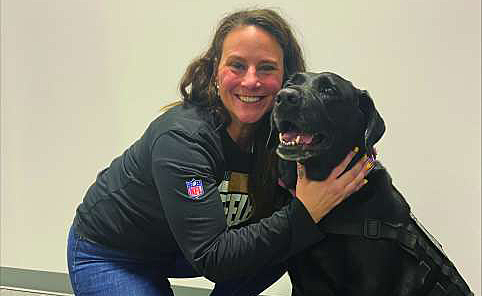Every year in the United States, 1.4 million people sustain a traumatic brain injury. Of these, about 50,000 die, 235,000 are hospitalized and 1.1 million are treated and released from an emergency room.
Head injury is much more common in young adults than in the elderly. Trauma is the leading cause of death in people under the age of 40.
The main causes of head injury are falls, motor vehicle accidents, and assaults.
Trauma to the head can lead to several types of injuries, including:
- skull fractures
- concussions
- cerebral contusions
- diffuse axonal injury
- epidural hematomas
- subdural hematomas
- intracerebral hematomas
Skull fractures result from a significant blow to the head and can be associated with any of the above listed injuries. Concussion refers to a relatively minor injury, causing a relatively brief loss of consciousness. Cerebral contusions are "brain bruises" which occur from acceleration and de-acceleration of the head. Head trauma can also produce microscopic changes that are scattered throughout the brain. This category of injury is called diffuse axonal injury (DAI) and refers to the microscopic severing of axons (fibers which allow brain neurons to communicate with each other). If enough axons are injured in this way, then the ability of nerve cells to integrate and function may be lost or greatly impaired.
In addition to the above injuries, there are three types of hematomas associated with head trauma:
- intracerebral (in the brain)
- subdural (between the brain and the dura)
- extradural (between the skull and the duras)
Treatment
Level 1 Trauma Center
Level 1 Trauma centers are nationally recognized hospitals that are equipped to handle the most critically injured patients and have met high standards for trauma care, education and research. The Level 1 verification from the American College of Surgeons is the highest national recognition a trauma center can receive. To receive Level 1 verification, a hospital must meet rigorous criteria in areas of its emergency department facilities, operating room facilities, intensive care units and 24-hour in-house coverage by emergency room physicians and trauma surgeons, and prompt availability of care in orthopedic surgery, neurosurgery, anesthesiology, radiology, thoracic surgery and critical care. UF Health is one of seven Level 1 Trauma centers in the state of Florida.
Initial Treatment
In case of loss of consciousness, first the person's airway, breathing and circulation should be controlled and then the head and neck should be stabilized. This is usually performed at the scene of injury prior to bringing the patient to the hospital. Most patients are quickly transferred either by air or ground to a Level 1 Trauma center. Upon arrival a trauma patient is evaluated from head to toe for possible injuries. In evaluating head injury specifically, neurosurgeons utilize a scale, the Glasgow Coma Scale (GCS), to assess severity. This aids in diagnosing the patient as having mild, moderate, or severe head injury. Patients who have a higher GCS score upon arrival(greater than 8) have a better long-term outcome. Patients with lower scores have a worse prognosis.
Mild Head Injury
Most patients with a head injury will receive a head CT scan to evaluate for bleeding. If the patient is doing well with no findings on CT scan, they may be sent home from the emergency room, with instructions for observation by a family member or friend.
Severe Head Injury
Patients with severe head injury will be admitted to an intensive care unit for close neurological monitoring. Patients that remain unconscious and have low GCS scores (less than 8) will often be monitored in the intensive care unit for signs of increased intracranial pressure (ICP). A device called an ICP monitor is placed within the brain to record pressure within the skull. This procedure involves drilling a small hole in the skull (about the size of a dime) and passing a thin fiber optic wire into the brain to monitor brain pressure. High pressures correlate with poor outcome, thus prompt recognition of elevated ICP is important. Treatment consists of surgery if there is significant brain swelling or bleeding. Incases where surgery is not indicated, a medication called mannitol may be used to lower the ICP. Other methods of controlling ICP include drainage of cerebrospinal fluid through a ventriculostomy (drainage tube placed into a brain ventricle) and deep sedation with chemical paralysis.
Prognosis
The prognosis of a head injury patient directly correlates with the GCS score upon arrival to the hospital. People with high scores, e.g. GCS 13-15 tend to do well. In addition, patients treated at Level 1 trauma centers tend to have better outcomes. The outlook for someone with a minor head injury is generally good, although recovery may be delayed and symptoms such as headache, dizziness, and cognitive problems can persist for up to a year or longer after an accident. Serious head injuries can be devastating, producing permanent mental and physical disability. Epileptic seizures may occur after a severe head injury, especially a penetrating brain injury, a severe skull fracture, or a serious brain hemorrhage. Recovery from a severe head injury can be very slow, and it may take years to heal completely. Risk factors associated with an increased likelihood of memory problems or seizures after head injury include age, length and depth of coma, duration of post-traumatic and retrograde amnesia, presence of focal brain injuries, and low initial Glasgow Coma Scale score.
